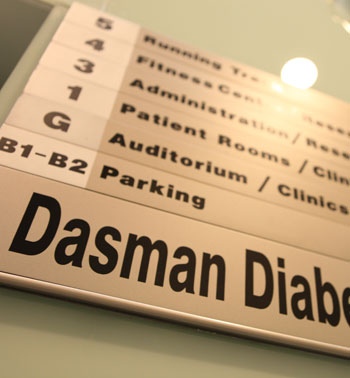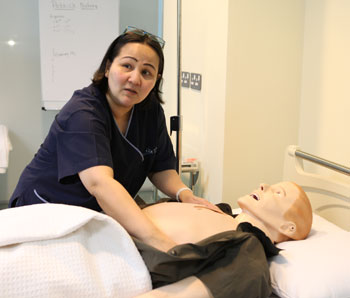Diabetes in Kuwait: Kuwait`s No. 1 Health Problem
Interview with Dr. Kazem Behbehani, Director General of Dasman Diabetes Institute. Kuwait ranks as 3rd country in the world with the most cases of diabetes. Diabetes is a No. 1 health problem in Kuwait – young generation suffers from this condition as well as the elderly. According to Dr. Behbehani, prevention and education are very important in fighting off this serious health problem.
Kuwait is reforming the healthcare system through various channels and new plans are allocating millions of dollars to the very ambitious plan to increase the amount of hospital beds by 3,565, which is about a 60% increase. What is your overall assessment of the healthcare sector in Kuwait? What do you think should be done to improve it? Can you comment a little bit on the number of beds?
Article 15 in the constitution of Kuwait refers to public health, ensuring that adequate facilities are provided for the population living in the country. Healthcare is free in Kuwait, as are other fundamental services such as education.
We have a unique health system in the country, with 6 general hospitals and over 94 primary health care centers reporting to these hospitals.

In addition to these hospitals, there are many more specialized health facilities that are focused towards cancer and other diseases, specifically those that are highly prevalent within the country. The prevalence of communicable diseases in Kuwait is very low compared to what it was in the past. Essential vaccination is done alongside a lot of prevention work. However, chronic diseases, such as Diabetes, are growing at a rapid rate.
The problem with Diabetes is that it can go unnoticed for a long time. There are two main types of Diabetes, Type 1 and Type 2. With Type 1 a person is required to be on insulin from its onset in the early years of life. Type 2 Diabetes usually develops later on in life, and if it is not promptly diagnosed and successfully managed, a person will be likely to encounter some of the adverse complications of Diabetes.
Unfortunately, in recent years in Kuwait, as well as in other countries around the world, Type 2 Diabetes, characteristically of adult onset, has begun to occur in younger age groups. This more or less relates to (apart from the genetic component) lifestyle; the amount and type of food you eat, and the lack of exercise that is common in today’s largely sedentary society.
The Dasman Diabetes Institute was built in response to a survey conducted about 8 years ago where 150 physicians identified that the future health need of Kuwait was to focus on Diabetes. The Institute was built at the time of his highness the late Amir Sheikh Jaber Al-Ahmad Al-Jaber Al-Sabah and it was inaugurated on June 6th 2006 by the present Amir his highness Sheikh Sabah Al-Ahmad Al-Jaber Al-Sabah with the aim of preventing, controlling and mitigating the impact of Diabetes and related conditions in Kuwait.
I have been at the Institute for two years and five months now.
We don’t exercise or do the activities that we used to do as kids, like going back and forth to school, playing in the garden and street, or playing football. It doesn’t exist anymore, or at least, it doesn’t exist as much as it used to.
Based on prior evaluations of the situation in Kuwait, a committee of experts from both inside and outside Kuwait and I are putting together a plan in order to establish how best to approach the problem of Diabetes. It essentially relates to two factors: lifestyle, and the quantity and quality of your food intake.
We need to look at how to make a difference now, and to ensure that the lifestyle changes of the population are lasting ones in order for them to positively impact the future. Unfortunately, 47% of the population is obese. With obesity alone, a person can lose up to 9 years of your life. With both Diabetes and obesity, this rises to a loss 15 years of life.
With Type 2 Diabetes now occurring in children as young as 10 years of age in Kuwait, the primary concern is what we should do now in order to encourage and enable the population to lead a healthier lifestyle, ultimately to diminish this loss of lifespan and to increase the population’s healthy years of life. We have not yet seen the full impact of Type 2 Diabetes on the health system in the country, and we have not calculated the costs to the people and to the government and its health system. We are currently conducting a study on this to provide a knowledge-based recommendation.
Let’s get back to the sector itself. How important is medical tourism for Kuwait? Can you say this is the center of excellence?
In order to attract medical tourism to the country, you need to have an ideal health system including ample resources and facilities.  At this point in time, government facilities may not be able to deal with the increased load that medical tourism would bring considering that services are currently free. However, there might be the capability if patients were charged for treatment as in other countries around the world.
At this point in time, government facilities may not be able to deal with the increased load that medical tourism would bring considering that services are currently free. However, there might be the capability if patients were charged for treatment as in other countries around the world.
The hospitals are very busy and primary health care centers are not the place for medical tourism. Currently, some private sector services can accommodate for this. Eventually, medical tourism in Kuwait is possible, but at this stage we need to concentrate on a number of things to make the healthcare system more efficient and to optimize our use of the facilities available.
There is no connectivity between the primary health care centers and the hospitals in Kuwait, so communication between them is not always easy. An electronic network is needed to connect all of the primary health care centers to the general hospitals.
We will have completed the establishment of a network in all of the governorates in Kuwait by the end of February 2012. This means that all of Kuwait will be on one integrated network and that no matter where a patient is seen, their electronic medical records will be accessible to the health care professionals.
Concurrently, we have agreed with the Ministry of Health that the Standards of Care will be available in the electronic system where it will help doctors and other health care professionals to make appropriate decisions backed by international guidelines, which have been based on sound evidence.
We are also in the process of training primary health care professionals in best practice for dealing with the chronic conditions.
In the past, medical schools within the region did not teach nor place emphasis on how best to care for chronic conditions, especially Diabetes. So plans to retrain primary health care professionals to update their knowledge in order to optimally treat Diabetes are in place. We are training about 500 healthcare professionals in collaboration with the University of Dundee in Scotland and also Harvard University in Boston to attain higher degrees and certificates.
We will have the input of knowledge and experience of renowned institutions with us in order to move these endeavors to the next level. I think for that we are very fortunate and unique within the region, and even throughout the world.  From the standards that we are putting in place to the methods in which we deal with patients, it is clear that we are very different.
From the standards that we are putting in place to the methods in which we deal with patients, it is clear that we are very different.
We are not primary, nor secondary, but we provide tertiary services for complicated cases as a knowledge-based institution. We are able to give the patient a complete package; from education, to clinical support including diabetologists, dietitians, podiatrists, ophthalmologists, and clinical pharmacists to name a few, to the research and interventions we do with them. We have a walking track, swimming pool, and gym with specialized staff and exercise physiologists to show people how to modify their lifestyle. We also have ongoing cooking classes to exemplify healthy cooking and eating habits. We have a lot of training activities for the public whether they are diabetic or not because at the end of the day it is an individual’s responsibility to take care of their health.
People need to apply the principles of healthy living that they have learned. It is not good to eat so much and to lead such a sedentary life; that promotes obesity, which carries with it many complications, and the onset of Diabetes at an earlier age. There are many things you can do to postpone of even prevent Diabetes; people require more education.
We have a genome center here, where we look at the relationship between genes and disease. This is more to identify who is susceptible to a chronic illness in order to intervene and hopefully prevent or delay onset, rather than to understand which genes are involved.
We already have 50 ongoing research projects at the Institute. Most are investigating Diabetes and Diabetes-related conditions – its complications, obesity, and other areas for the benefit of both people in Kuwait as well as elsewhere. It’s the population as a whole that we have to look at because Diabetes is also highly prevalent outside of Kuwait and they face the same challenges as we do here. We have to look at the total package of the scope of the problem and assess what needs to be done. We try to make sure that people, especially the young, are well informed and know what they can do to prevent the growing epidemic that we’re faced with today.
This interview is a good method of educating people about Diabetes and spreading the message the dangers of this disease, so what are the symptoms and treatment? How big is the problem?
We actually have many methods of reaching out to people. For example eHealth, which are electronic health messages going out to the public via their mobile phones with the help of a telephone company. These messages go out not just to people with Diabetes but also to the entire population, which encourages prevention and education.
Secondly, there is citizen-centered health and building a knowledge-based society. For education, we have partnerships with outside institutions like the Joslin Center, and have developed a lot of the materials for teaching. All other materials developed here for the training of the public and doctors as well as other healthcare professionals are endorsed by Harvard University. We work with Harvard and its affiliates, and host research projects in collaboration with the Harvard School of Public Health and the Forsyth Institute among others.
We also do work with institutions in the UK. For example, we work with University College London in the field of genome research. We also work with the Universities of Oxford, Cambridge, and Dundee on a variety of projects and programs.
We have nearly 20 agreements with renowned Institutions around the world. Knowledge is critical. Decision-making for us is based on the experience and knowledge that has been developed in other centers of excellence.
In terms of Diabetes, how big is the problem in Kuwait?
Unfortunately, we are ranked number 3 in the world according to the IDF (International Diabetes Federation) announcement in December 2011. It is sad to hear this and I am very sad to mention it because the full impact that is yet to be seen is daunting since the younger generation is now affected as well as the old.
If we do not act now to help people understand what they should and should not do, we will have a lot of problems in the future. People need to comprehend the implications of their action and inaction. It could be a disaster for the country and the world as far as I’m concerned. The cost to the government would be unbelievable, as well as the costs to the people, their condition of living, and the life expectancy.
The problem began primarily after the liberation of Kuwait. Lifestyle has changed dramatically.  A simple example of this change is the frequency at which young people are eating out of the house, and the overwhelming number of tempting food options available to them in unspeakable portions and calories counts. This did not exist, and the education to counter this transition is not there.
A simple example of this change is the frequency at which young people are eating out of the house, and the overwhelming number of tempting food options available to them in unspeakable portions and calories counts. This did not exist, and the education to counter this transition is not there.
Lifestyles have changed dramatically with the increase of wealth and technology. Even in less economically developed countries, where they were only concerned with diseases like malaria, these communicable diseases are now coupled with chronic illnesses such as Diabetes.
If you even look at the amount of calories in many drinks today, they amount to quite a lot due to their sugar content. We don’t walk and we have the luxury of private cars. We don’t exercise or do the activities that we used to do as kids, like going back and forth to school, playing in the garden and street, or playing football. It doesn’t exist anymore, or at least, it doesn’t exist as much as it used to. It’s easy to see the slippery slope of an increase and excess in poor quality calories and a reduction in physical exertion.
40% of the population of Kuwait is less than 15 years of age, and 60% is younger than 20 years. These are the ages that will be most affected, more so than the older generations.
What has been done in terms of research, treatment, and prevention? Could it be that in 5 years we have a treatment for Diabetes?
Treatment is available. Prevention is what we have to work on. We have insulin, we have tablets, we have other tools to manage Diabetes, but no one wants to take tablets and drugs for their entire life.
For Diabetes to be cured you need islet cells that will produce insulin that will work correctly in your body. Insulin is not the cure. Insulin is needed to take the glucose (sugar) from the food you eat, from your blood to the cells of your body to be used. If you don’t have insulin, or it doesn’t function properly, the glucose stays in the blood causing complications that affect your eyes, nerves, feet, kidneys, heart, and veins.
This is not a complication of Diabetes. It’s a complication of having high sugar levels in your circulatory system for a long time. Initially, you don’t have a fever or other external symptoms, so you don’t feel it, and that’s the problem. The other aspect we need to focus on is the relationship between Diabetes, obesity, and cancer. As I mentioned, 40% of the population is obese. What type of relationship does this have with Diabetes and Cancer?
When we begin to answer some of these questions through coherent research studies, we will be in a better position to prevent and predict the future of Diabetes.
What are the challenges this institution is raising, both strategically and operationally?
I do not see it as challenges. For me, it’s how we can be of most use in order to make the changes necessary for the future health of the country. You can call that a challenge. It’s important that as an Institute that provides tertiary care services that we focus on the more difficult and complicated cases.
The problem is that we have over 250,000 people in Kuwait with Diabetes. We, as an Institute, do not have the facilities to treat that number. That is why we are looking at how to help and support the health system in Kuwait so that it can meet the necessary standards to help those with Diabetes. What we do more is research to understand the issues scientifically and to also to understand how to optimally use the facilities here, for example people using the facility for education even if not a patient.
We have about a hundred eLearning courses we are currently developing, and we have already developed more than 60 that are going to be distributed and implemented in schools. We produce a monthly magazine for children to teach them what they should and should not do through the use of cartoons. I believe that this will have an impact.
eLearning materials were tested in a couple of countries within the region. They were successful in changing the lifestyle patters of children less than 11 years of age, and in turn we predict that parents will listen to their children. That’s not to say that we do not train the parents, we do. We have the weekly healthy cooking demonstrations, for example. We also target the educators by training many teachers from the Ministry of Education. We are training a lot of dietitians from the Ministry of Health in specialized Diabetes care, which is much needed. It is not medicine. We aim to target as many sectors of society as possible. This is important if you want to make lasting changes in a country.
We also work with groups of patients here running the DAFNE project, teaching people with Diabetes what they need to do in order to live with the condition. The model is proving to be a success. Every aspect of treatment (with the exception of surgery) is available under Dasman Institute’s roof, from diagnostics, to education, to exercise and nutrition.
We have a 24-hour call center that people can utilize to ask questions and receive answers regarding Type 1 Diabetes. We run a lot of clinics, about 45. They open at 8:30 a.m. and close at 9:00 p.m.. Our exercise facility has been very successful in demonstrating the impact of exercise and the maintenance of a healthy lifestyle on individuals.
People come here and they become and feel healthier. As much as 6% of the population has undergone amputations. We have the facilities and experts here that have saved a lot of amputations. We are also training others in this field.
Lastly, how do you prevent Diabetes? What is the prevention?
Prevention is to understand how people get Diabetes and to take action on the preventable causes in order to avert the onset of the condition. It is the amount and quality of the calories you consume as well as appreciating the value of exercise. It is important to eat less food and better food. The food doesn’t have to taste different, simple substitutions (add more vegetables; switch white rice, bread and pasta for brown; use herbs and spices to reduce some salt etc.) can change the health benefits of a meal. Unfortunately, portions here are large, that is a problem. Ultimately, education, education, education in order to understand what to do and what not to do is the key.
If you combine this with an active life and/or exercise regimen, the rest is not difficult.
Make the changes before it’s too late and sustain them. Stay healthy for your future. Worrying about it later is too late.